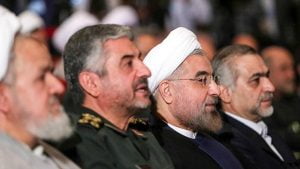Rouhani’s Intelligence Ministry and Khamenei’s IRGC Widen Crackdown Ahead of Election
The number of arrests carried out by Iran’s Intelligence Ministry, operating under the control of President Hassan Rouhani, increased in the last few months leading up to Iran’s May 2017 presidential election.
Research by the Center for Human Rights in Iran (CHRI) indicates that since January 2017, the ministry has increasingly targeted civil and women’s rights advocates, journalists, dual nationals, ethnic and religious minorities, environmentalists, the administrators of social media pages, and relatives of protesters killed during the state’s crackdown on peaceful protestors following the disputed 2009 presidential election.

The increasing arrests may be the result of a growing rivalry between the Intelligence Ministry and the Islamic Revolutionary Guard Corps’ (IRGC) Intelligence Organization, which has also stepped up its arrests.
Supreme Leader Ali Khamenei set up the organization, which the office of the presidency has no control over, in 1997 after the election of reformist President Mohammad Khatami. Amid the protests against the contested presidential election in 2009, Khamenei expanded the organization’s powers.
Rouhani would not have been elected in 2013 without the support of reformists and civil society, both of which are being targeted by Khamenei’s security apparatus and that of a president they helped to elect.
While there are several possible explanations for why the Intelligence Ministry is stepping up its arrests at this particular time, the widening crackdown proves to the Iranian people that Rouhani—who will be seeking a second term on May 19—has failed to carry out his campaign promise of freeing political prisoners and loosening the Islamic Republic’s tight grip on civil society.
Rouhani’s Intelligence Ministry: Protector or Aggressor?
“A desirable Intelligence Ministry is the hopeful home of the oppressed,” Rouhani told the ministry’s staff on January 21, 2014, less than a year after his election. “Respecting the rights of citizens, as well as ethnic and religious minorities is an unavoidable necessity.”
“Your primary duty is to protect people’s dignity and privacy and preserve public trust at the highest level,” he said, emphasizing that his administration “believes in transparency and telling the truth to the people as our patrons.”
“We insist on the principle of plurality of views and tastes in society,” he added. “Supporting the rights of citizens is part of the ministry’s duties.”
The Intelligence Ministry’s record under Rouhani has not only shown a failure to realize that vision, but also a continuation of oppressive policies now being conducted in parallel with the IRGC’s Intelligence Organization.
When Mahmoud Alavi was introduced to Parliament as the new minister of intelligence on August 7, 2013, he told legislators that he would carry out his responsibilities in a manner that would “build public trust” while being “accountable to relevant authorities, watchdog agencies and public institutions.”
—
Iran Briefing | News Press Focus on Human Rights Violation by IRGC, Iran Human Rights

